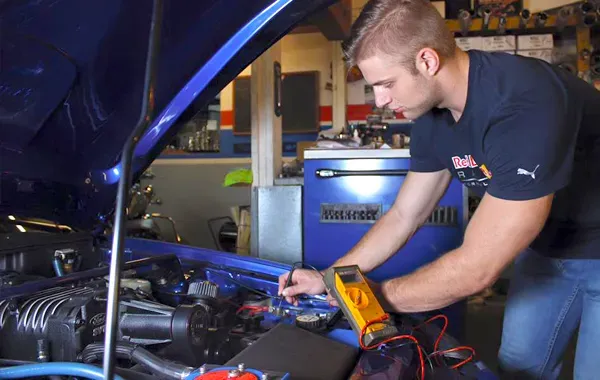Your car’s engine is its heart, and ensuring it operates smoothly is essential for safe and efficient driving. However, like any mechanical component, engines are susceptible to wear and tear. Ignoring early warning signs of engine trouble can lead to costly repairs or even a complete breakdown. By recognizing potential issues early, you can address them promptly and save yourself from inconvenient and expensive problems. This article will guide you through the most common warning signs that indicate engine trouble and explain what actions you should take to keep your vehicle in top condition.
1. Unusual Engine Noises
Engines typically operate with a consistent hum. Any unusual noises—such as knocking, tapping, or grinding—could indicate underlying problems.

Common Causes of Engine Noises:
- Knocking Sounds: Often caused by worn-out engine bearings or low octane fuel.
- Tapping Noise: May signal low oil pressure or a malfunctioning valve lifter.
- Grinding Sounds: Usually associated with issues in the starter motor or timing belt.
Address these noises immediately by consulting a mechanic to prevent more severe damage.
2. Check Engine Light Activation
The check engine light is one of the most obvious indicators of potential engine trouble. While it doesn’t always signify a major issue, it should never be ignored.
Possible Reasons for a Check Engine Light:
- Faulty Oxygen Sensor: A malfunctioning sensor can affect fuel efficiency.
- Loose Gas Cap: A minor issue but still requires tightening to avoid fuel vapor loss.
- Catalytic Converter Issues: Problems here can result in reduced engine performance.
Use a diagnostic tool or visit a professional to identify the cause and resolve it promptly.
3. Reduced Fuel Efficiency
A sudden drop in fuel economy can point to engine inefficiencies. If you find yourself refueling more often than usual, your engine might be struggling.
Potential Causes of Reduced Mileage:
- Clogged Air Filters: These restrict airflow, forcing the engine to work harder.
- Fuel Injector Problems: Malfunctioning injectors can disrupt the fuel-air mixture.
- Spark Plug Wear: Old or damaged spark plugs reduce combustion efficiency.
Routine maintenance can help restore fuel efficiency and ensure your engine operates smoothly.
4. Overheating Engine
Engines are designed to operate within a specific temperature range. If your temperature gauge frequently spikes or steam emanates from the hood, your engine may be overheating.
Common Overheating Triggers:
- Low Coolant Levels: Often due to leaks or evaporation.
- Faulty Thermostat: Prevents proper coolant circulation.
- Radiator Issues: Blockages or broken fans can impair heat dissipation.
Stop driving immediately if your engine overheats to prevent severe damage like a cracked engine block or blown head gasket.
5. Rough Idling or Stalling
Engines should run smoothly at all times, including when idling. If you experience rough idling, sputtering, or frequent stalling, it’s a clear sign something is wrong.
Possible Reasons for Rough Idling or Stalls:
- Dirty Fuel Injectors: Can cause uneven fuel delivery.
- Worn Spark Plugs: Lead to inconsistent engine firing.
- Vacuum Leaks: Disrupt the air-fuel mixture needed for smooth operation.
A professional tune-up can help identify and resolve the underlying problem.
6. Excessive Exhaust Smoke
The color of your car’s exhaust smoke can reveal critical information about your engine’s health.
What Different Smoke Colors Indicate:
- Blue Smoke: Signals burning oil, often due to worn piston rings or valve seals.
- White Smoke: Typically caused by coolant entering the combustion chamber, indicating a head gasket issue.
- Black Smoke: Suggests the engine is burning too much fuel, possibly due to a faulty fuel injector or air filter.
Addressing exhaust smoke issues quickly can prevent more serious engine damage.
7. Persistent Oil Leaks
Oil leaks not only create a mess but also indicate potential engine trouble. Low oil levels can lead to insufficient lubrication, causing premature wear on engine components.
Common Causes of Oil Leaks:
- Damaged Gaskets or Seals: Can allow oil to seep out.
- Worn Oil Pan: May develop cracks over time.
- Loose or Faulty Oil Filter: Could cause oil to leak during engine operation.
Regularly check your oil levels and address any leaks promptly to maintain engine health.
8. Engine Misfires
An engine misfire occurs when one or more cylinders fail to ignite properly, leading to jerky acceleration or reduced power.
Causes of Misfires:
- Ignition System Problems: Worn spark plugs or faulty ignition coils.
- Fuel Delivery Issues: Clogged fuel injectors or a weak fuel pump.
- Vacuum Leaks: Disrupt the air-fuel ratio needed for combustion.
Misfires not only reduce performance but can also damage the catalytic converter if left unresolved.
9. Vibrations or Shaking
Unusual vibrations while driving or idling can indicate various engine or mechanical problems.
Common Sources of Vibrations:
- Damaged Engine Mounts: Cause the engine to shift excessively.
- Imbalanced Tires: Lead to uneven vibrations that affect performance.
- Transmission Issues: Can create harsh vibrations during gear shifts.
Having these vibrations inspected can prevent further complications and ensure a smoother ride.
10. Strange Burning Smells
Burning odors coming from your engine should never be ignored, as they could indicate serious problems.

Potential Causes of Burning Smells:
- Overheated Oil: Can create a burnt odor due to excessive heat.
- Electrical Short Circuits: Often emit a plastic-burning smell.
- Worn Clutch or Brakes: May produce a distinct burning rubber odor.
Immediately investigating and addressing these smells can help prevent dangerous situations.
Conclusion
Recognizing early warning signs of engine trouble is crucial for maintaining your car’s performance, safety, and longevity. From unusual noises and overheating to misfires and oil leaks, these signs shouldn’t be taken lightly. By addressing issues promptly and maintaining regular check-ups, you can avoid costly repairs and extend your engine’s lifespan. Always consult a trusted mechanic for any concerns to ensure your vehicle stays in peak condition, keeping you safe on the road. Proactive care today can save you from significant headaches down the line.

Leave a Reply